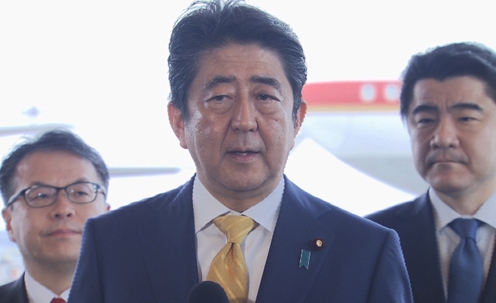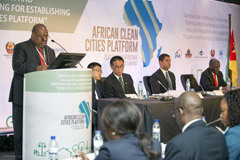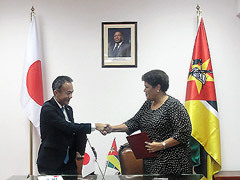Press Occasion on the Visit to Russia
Cabinet Secretariat, Thursday, April 27, 2017
[Provisional Translation]
Prime Minister Shinzo Abe held a press occasion at Tokyo International Airport (Haneda Airport).
The Prime Minister said the following,
"I will seek to steadily advance peace treaty negotiations with President Putin based on the results of our meeting held in Nagato City in December 2016. Toward that end, I would like to take a major step forward in carrying out joint economic activities in the Northern Territories and enabling their former residents to freely make grave visits. I also hope to hold frank exchanges of views with President Putin on various global challenges, including the urgent issue of heightening tensions surrounding North Korea and the situation in Syria, in order for us to work together toward addressing them."
Establishment of the African Clean Cities Platform: Aiming to solve waste problems in Africa’s cities
JICA, Friday, April 28, 2017
On April 27, the Japan International Cooperation Agency (JICA) and the Ministry of the Environment of Japan (MOEJ) joined 24 African countries [1], the United Nations Environment Programme (UNEP), the United Nations Human Settlements Programme (UN-Habitat) and the City of Yokohama in establishing the African Clean Cites Platform, in Maputo, the capital city of Mozambique. The launch ceremony for the platform was attended by the Minister of Land, Environment and Rural Development of Mozambique, Celso Ismael Correia, the President of the Municipal Council of Maputo, David Simango, the State Minister of the Environment of Japan, Tadahiko Ito, and the Director General of the Global Environment Department of JICA, Kunihiro Yamauchi, and a declaration on the establishment of the platform to provide support for solving Africa’s waste issues was announced.
As part of the follow-up to the Sixth Tokyo International Conference on African Development (TICAD VI), the African Clean Cites Platform has the objectives of sharing the knowledge of and experiences in waste management of each country, promoting the mobilization of public and private funds, and advancing the Sustainable Development Goals (SDGs) [2]. In addition, the platform aims to achieve “Clean and Healthy Cities in Africa” by 2030, which is the SDG target date, through training, seminars, data collection, the dissemination of information and other efforts.
With economic growth and rapidly rising populations, Africa’s cities face waste issues that are growing ever more severe. Initiatives for improving urban living environments are priorities for achieving healthy living for people and maintaining sustainable growth. The SDGs include the first international targets established for waste disposal [3], and every country is seeking solutions to waste problems.
At TICAD VI, which was held in Nairobi, Kenya, in August 2016, JICA hosted a side event titled the “Capacity Development to Achieve the SDGs on Waste Management: Toward Clean and Healthy Cities in Africa.” In the seminar, there was reaffirmation of the urgency of appropriate waste management, which is closely connected to people’s lives, in order to improve the poor sanitation in African cities, and of the need for a platform to prioritize waste management policies in Africa and to promote international partnerships and the sharing of information. With that background, JICA has worked cooperatively with the MOEJ, the UNEP and UN-Habitat to prepare for the establishment of the African Clean Cities Platform.
Under the platform, the governments of each country and partner agencies will cooperate in sharing knowledge, developing information and mobilizing funds toward solving Africa’s waste problems and achieving the SDGs.
1: Botswana, Burkina Faso, Cameroon, Côte d’Ivoire, Democratic Republic of the Congo, Djibouti, Egypt, Ethiopia, Ghana, Kenya, Madagascar, Malawi, Morocco, Mozambique, Namibia, Niger, Nigeria, Republic of Congo, Senegal, South Sudan, Sudan, Uganda, Zambia and Zimbabwe.
2: Sustainable Development Goals
At the UN Sustainable Development Summit held at the United Nations headquarters in September 2015, the 2030 Agenda for Sustainable Development was unanimously adopted by the 193 member countries and the SDGs were established as successors to the Millennium Development Goals formulated in 2001. The SDGs are composed of 17 goals and 169 targets that encompass such issues as climate change, renewable energy and urbanization issues that remain after the MDGs or that have newly appeared, and were determined as challenges for the international community to work toward achieving by 2030.
3: Major goals and targets pertaining to waste
Goal 11 (Sustainable Cities): Make cities inclusive, safe, resilient and sustainable
11.6: By 2030, reduce the adverse per capita environmental impact of cities, including by paying special attention to air quality and municipal and other waste management
Goal 12 (Responsible Consumption and Production): Ensure sustainable consumption and production patterns
12.3: By 2030, halve per capita global food waste at the retail and consumer levels and reduce food losses along production and supply chains, including post-harvest losses
12.4: By 2020, achieve the environmentally sound management of chemicals and all wastes throughout their life cycle, in accordance with agreed international frameworks, and significantly reduce their release to air, water and soil in order to minimize their adverse impacts on human health and the environment
12.5: By 2030, substantially reduce waste generation through prevention, reduction, recycling and reuse
Signing of Grant Agreement with Mozambique: Replacing three deteriorated bridges in the Nacala Corridor for efficient goods distribution
JICA, Monday, May 01, 2017
On April 28, the Japan International Cooperation Agency (JICA) signed a grant agreement with the Government of the Republic of Mozambique in Maputo to provide grant aid of up to 3.419 billion yen for the Project for Construction of Bridges on N380 in Cabo Delgado Province.
The project will rehabilitate three bridges along National Highway 380, which is in Cabo Delgado Province and part of the Nacala Corridor that connects Mozambique and Malawi. This rehabilitation will make the flow of goods efficient within the region, stimulate the economy of the surrounding region and contribute to living improvements for local residents.
Running north-south from the northernmost point of Mozambique through the Nacala Corridor, National Highway 380 plays the role of connecting the Mtwara Corridor and the Nacala Corridor, both of which extend east and west. It is also a key access road for advancing the development of natural gas in the north of Mozambique off the coast of Ruvuma in the Indian Ocean. However, there are obstacles to goods distribution through the region, such as that many of the bridges along the road are temporary and ill-suited for large vehicles, and that during the rainy season, there are periods when the Messalo I, Messalo III and Mapuede Bridges that cross the Messalo River Basin are impassable due to flooding. Having suffered damage and deterioration particularly from the river flow during the rainy season, the three bridges are in danger of collapsing.
The project will replace the Messalo I, Messalo III and Mapuede Bridges (total length of 350 meters), eliminating the obstruction of traffic due to flooding and making it possible for large vehicles to pass, and it is expected that the time to travel between the key junctions along National Highway 380 will be greatly shortened. It is also expected that this initiative will improve the north-south goods distribution network for the Nacala Corridor, stimulate trade in the surrounding regions and promote development of the regional economy.
Country
Republic of Mozambique
Project title
The Project for Construction of Bridges on N380 in Cabo Delgado Province
Planned implementation period
42 months, including detailed design work and the bidding period
Executing agency
National Roads Administration
Target region, facilities
Messalo I, Messalo III and Mapuede Bridges on National Highway 380 in Cabo Delgado Province
Specific project details (provisional)
(1) Facility construction
Replacement of three bridges (total length of 350 meters) in the target region
(2) Consulting services
Detailed design work, construction supervision

































